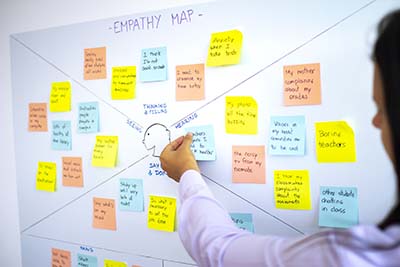The importance of empathy is often overlooked as a critical leadership skill. However, a recent survey by Catalyst of almost 900 employees across industries looked at the effects of empathetic leadership on the work experience and found that it is a driver of significant business results. The survey found that 61% of people with highly empathetic senior leaders reported often or always being innovative at work compared to only 13% of people working with less empathetic leaders. Likewise, 76% of people with empathetic leaders reported being engaged at work compared to just 32% who experienced less empathy. The study also found that employees working for more empathetic organizations were less likely to consider looking for a new job, an important consideration during the current “Great Resignation”. Leaders today must understand other people’s perspectives, feelings, and circumstances to support key stakeholders and drive results in challenging times. Luckily, empathy is a skill that can be learned and improved.
5 Ways To Develop and Demonstrate Empathy at Work
- LISTEN MORE – Kristin Peck, Fortune 500 CEO of Zoetis recommends, “slowing down and spending a lot of time listening to the challenges people are facing personally and professionally. What the pandemic did was make everybody realize we were all in the same storm, but our boats were quite different. We had to become very clear about the importance of listening to people and understanding their needs, and being flexible.”
- PRACTICE EMOTIONAL INTELLIGENCE – Effective leaders are aware of their own emotions and the emotions of other people. They must be able to read the room, whether it is the boardroom or the breakroom. Crestcom subject matter expert Colleen Stanley explains, “If you’re not reading the emotional temperature of the room, you’re not seeing people that have maybe angst about workload or their own abilities. Empathy is pausing to say, now let’s talk about this because when we don’t demonstrate empathy, leaders miss the meeting after the meeting, so that’s why empathy is so important. You get to have the conversation in the room versus missing the conversations that occur outside of the room.”
- BE PRESENT – Focusing on others and demonstrating empathy can be challenging in an increasingly digital world. It has become very common for people to multitask during meetings or check their phones when listening to someone. Giving your undivided attention to someone allows for more human connection and facilitates better communication. When meeting with someone in person, turn off your devices. If meeting remotely, close all other applications and look at the camera and screen as much as possible. Nothing makes someone feel as unimportant as talking to someone looking in a completely different direction and visibly typing during a meeting.
- TEAMBUILDING – Teambuilding activities that involve role-playing or listening games are very effective for increasing empathy for co-workers and employees. Break a group into partners and have one person tell a personal story for 30 seconds. Then, ask the second partner to repeat that story to the group. Then swap partners and do it again. This exercise is a great way to improve listening skills and get to know more about each other.
- LEARN CONTINUALLY – Leaders that create a learning culture in their organization demonstrate humility by admitting there is always room to grow and improve. Organizations can help their leaders and employees develop empathy by providing opportunities to learn and enhance essential leadership skills like communication, conflict resolution and emotional intelligence.





